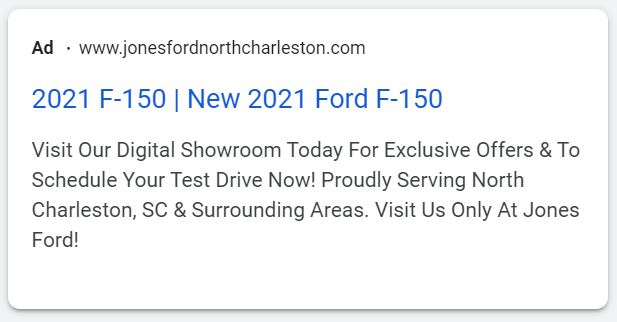Is Google AI a Lie?
I recognize this is a bold question. We’ve all been sold that AI is going to revolutionize marketing and allow us to use super computing to solve our marketing problems. I remember being excited about this new possibility, and then I used it.
Google Ads AI
Google has applied AI in a few different ways. I’m going to focus on the key recommendations they continue to make to me in Google Ads and break down my results from following these AI recommendations.
Use Target Cost Per Acquisition
In English this is the concept that if I tell Google what I’m trying to accomplish it will customize my ads and show them to people most likely to complete my goal.
This sounds great! It’s very difficult to decipher by keywords alone if someone is searching for my dealership because they need an oil change or a new truck.
So I chose the goal of Store Visits.
Target Store Visits
The promise is Google will measure customers who both click our ads and then visit the store. So they can actually determine if someone visited our Dealership after seeing our ad. Sounds great!
The Reality:
Service got busy and the showroom got quiet.
When I asked for more information on how Google measures store visits, two different Google reps admitted they cannot determine the difference between a customer looking for an oil change and a customer looking to buy a car.
This fundamental flaw means that if Google is trying to get me the cheapest visitor to my store they are going to focus on oil change customers because new vehicle customers are more expensive. This boost to service and collapse of new and used car sales played out every time we activated Target Cost Per Acquisition.
Conclusion: We have fully disabled this functionality in Google Ads.
Create Responsive Search Ads
Concept sounds good. You create a whole bunch of ad puzzle pieces and google assembles them in the order they think will best appeal to customers. By using their AI knowledge they will better match the ad copy to what customers are looking for.
This is very similar to an older product Google used to use. Previous to this, Google recommended having a bunch of different ads and they would automatically match the ad with the right keyword for us.
The Reality: We keep finding Ads with almost identical elements matched together. For Example: 2021 Ford F-150 : New Ford F-150. Not terribly bad, but also not nearly as helpful as a complete ad that makes sense and doesn’t repeat.

So what’s the harm of having Google mess it up sometimes? When Google gets it wrong and mismatched something the consequence falls on us. Our Customers got the wrong ad and our cost increases because of it. Yes, Google will penalize your quality score if they match the wrong things up for customers.
Conclusion:
It’s better to have proven ads customized to each keyword than to have a hodgepodge of dynamic puzzle pieces that Google, may or may not, match up correctly.
These are just two implementations of Google AI doing a worse job than the system beforehand. Rather going deeper into examples I want to talk about the big picture. Out of all the “AI” based improvements I haven’t found one that truly performs better than a well tooled PPC account. If you think about it for most maybe this is ok. If the goal of AI is to help the 95% of marketing companies maybe these companies never achieved the organizational recommendations that the top 5% did. Maybe a less effective AI solution is better than the average chaotic solution most PPC vendors are currently using.
There is another theory though and this gets to the heart of my title. What if AI is a fancy term for a smoke screen. What if Google has looked at the landscape and determined a few key things.
- Search isn’t growing like it used to. In fact it may shrink as competitors chip away at their market share.
- With less growth they need more profit on less searches.
- Marketers in large part are better at using their tools to avoid bad searches.
- Google is no longer alone, (I know Bing has always been there) Facebook is a powerhouse and it’s sucking marketing revenue away from Google.
- As Auctions get more competitive businesses are quitting PPC and going to other competitors like Facebook for less money.
Final Conclusion:
At this point it appears Google AI at best is a sloppy second place solution to a well run PPC Account. At worst, it’s an intentional money grab from their clients under the guise of a ground breaking technology. I’m hoping it’s the first and who knows maybe it gets better, but for now I’m disabling it wherever I can and dominating markets where competitors are trying to make it work.

